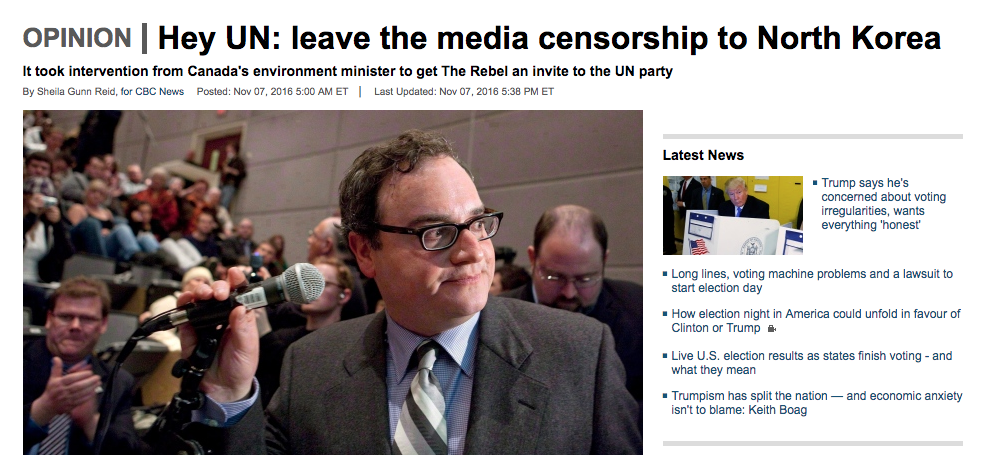This week, CBC officially launched its “new destination for debate,” CBC Opinions.
It’s unclear why the public broadcaster thinks that this venture makes any sense this late into the blogging game.
“The goal is to give our audience a destination for intelligent, provocative debate and commentary on the issues of the day,” said Jennifer McGuire, General Manager and Editor-in-Chief.
And so, on day one, that’s what we got. The articles that launched the platform included: why making friends with refugees can be complicated, why men’s “groping days are over,” why the Prime Minister needs a “proper plane” and why social media companies shouldn’t ignore Black users.
If you head to the Huffington Post Canada, a website that has been in the blog hosting business for many years, you get another set of blog posts: why Canadians should support protestors at Standing Rock, why you should remember the Home Front when remembering the world wars, and why parenting a threenager pretty much sucks (tell me about it).
These are optimized for clicks, for pageviews and for social media sharing. The model leverages an engaged writer or organization to provide content that argues a point of view, with minimal overhead.
rabble.ca‘s been doing this for years. Those of us who are routinely denied access to the Full Comment section of the National Post come here, or to other progressive news organizations, and effectively do the same thing.
Think-pieces are so mundane that it’s hard to see past the echo-chamber effect that often accompanies them. Articles rarely pierce through existing barriers. We read what speaks to us and we remain politically atomized.
Some of us write in these forums because, thanks to our politics, we simply can’t go anywhere else. Some of us use these forums to bring attention to issues that matter, or issues that don’t at all matter. Some of these things go viral and most don’t.
With the emergence of self-publishing platforms and the communities that surround them, like Medium, or the emergence of new online spaces like The Establishment, the CBC has to do better than the status quo if it wants to go anywhere.
Rather than bucking the status quo, they’re chasing it. CBC hired former-National Post columnist Robyn Urback to produce the new platform. She can be fondly remembered as the author of: “We should interrupt the outrage cycle once in a while to recall we’re all just a bunch of idiots“, “Tony Clement’s anti-terrorism plan is, in a word, bananas,” “France’s ban was out of line, but we should resist seeing the burkini as a symbol of ‘freedom,‘”and “How can Black Lives Matter claim ‘victory’ when Pride has left so many divided?“
Indeed, hiring Urback confirmed to anyone worried that the CBC’s new platform would actually offer critical and smart analysis that it probably will not.
And she’s delivered. Among the first five articles launched is what is effectively advertorial space for a competing online platform, Ezra Levant’s The Rebel. I’m excited to hear what Postmedia’s CEO writes about the future of his news empire or the struggles of a small-budget prairie magazine from Briarpatch editors in future CBC opinions pieces.
In her article, “Hey UN: leave the media censorship to North Korea,” Alberta Bureau Chief of The Rebel Sheila Gunn Reid breaks at least one of the new platform’s rules: to not write in the first person, with this deadly lede: “The United Nations isn’t all that into me.” She then goes on to say exactly what you’d expect an acolyte of Levant would say: banning a half-rate blog is a slippery slope to total censorship, what’s next will they censor Zionists, the UN is basically North Korea and Morocco and so on.
There are so many ways that a new analysis feature at the CBC could have been done well. Why not redesign the platform, let it stand apart completely from the news website, and add features that could improve the ease of engagement of average people? Why not create ways for people to dialogue through a curated Wiki? Why not use the strength of the resources that are available to the CBC and do something new? Forget columns: why not find young vloggers, create a Speakers Corner of the twenty-first century or do pretty much anything else that isn’t being done to death already, elsewhere.
The answer is probably along the lines of: this is hard, it requires creativity, risk and importantly, more full-time staff. The opinions platform is not intended to be risky or creative. And that’s a wasted opportunity.
There is a serious lack of broad political analysis within the mainstream press. Analysis is so narrow that it either touts a dogmatic conservative line, or it all fits under the Liberal Party’s Big Tent. Rather than trying to figure out new ways to offer analysis (rooted in facts, interviews, research and arguments), the CBC went in the most obvious, and most boring direction possible.
We don’t need to hear about what Sheila Gunn Reid thinks about her right to access the UN. She already has a publishing platform and the CBC has already reported on the story. We don’t really need to hear any of this at the CBC at all: Huffington Post and so many other sites have been there for years.
If the CBC wants Canadians to see the Corporation as a pubic service, offer us something new and something necessary.
Interested in submitting your own opinions piece to the CBC? Don’t follow Nora’s lead: sign up here. (Or better yet, submit to rabble’s The Views Expressed blog at [email protected].)




